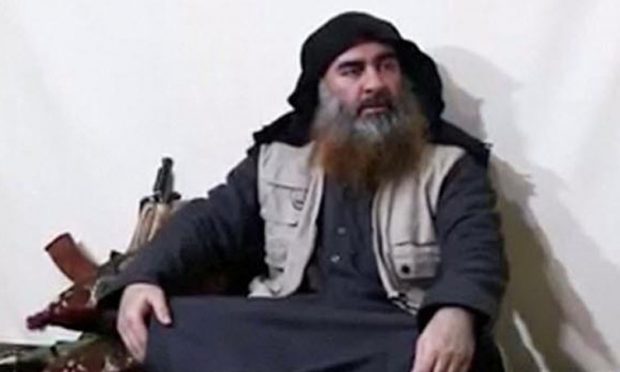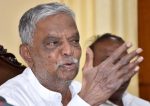
Islamic State leader leaves a legacy of terror
Team Udayavani, Oct 28, 2019, 3:53 PM IST

Abu Bakr al-Baghdadi sought to establish a new Islamic “caliphate” across Syria and Iraq, but he might be remembered more as the ruthlessly calculating militant leader of the Islamic State group who brought terror to the heart of Europe and set up a short-lived organisation so extreme that it was shunned even by al-Qaida.
With a USD 25 million U.S. bounty on his head, al-Baghdadi steered his chillingly violent and surprisingly disciplined followers into new territory by capitalizing on feelings of Sunni supremacy and disenfranchisement at a time of tumult that followed the Arab Spring.
One of the few senior IS commanders still at large after two years of steady battlefield losses, al-Baghdadi died Saturday when he detonated his suicide vest in a tunnel while being pursued by U.S. forces north of Idlib, Syria, killing himself and three of his children, U.S. President Donald Trump announced Sunday. He was believed to be 48.
“He didn’t die a hero, he died a coward, crying, whimpering and screaming,” Trump said at the White House, adding that the U.S. had al-Baghdadi under surveillance for weeks.
Militants under his command were some of the first jihadis to grow up with the internet, and they deftly exploited social media to tout their military successes, document their mass slaughter, beheadings and stonings, and promote the Islamic State to a global audience.
The announcement of his death came nearly two years after Iraq announced the defeat of IS and five years after the group humiliated its armed forces and seized nearly a third of the country.
In April, U.S.-backed Kurdish-led forces in Syria declared the group’s territorial defeat after liberating the village of Baghouz in eastern Syria, its last bastion. The Islamic State saw its territory shrink from an area the size of Britain to a speck in the Euphrates River valley. Though at minimum a symbolic victory for Western counterterrorism efforts, it is unclear what impact his death will have on possible future attacks. He was largely regarded as a figurehead of the global terror network, and was described as “irrelevant for a long time” by a coalition spokesman in 2017.
French President Emmanuel Macron said the death of al-Baghdadi is “only a step,” adding that the fight continues “so that the terrorist organization is definitely defeated.”
Also unclear is who will replace him as leader. The group has lost many of its senior commanders in U.S.-led airstrikes, including Fadhil Ahmad al-Hayali, described as the group’s No. 2 who was killed in Iraq by an August 2015 U.S. airstrike, and Abu Ali al-Anbari, the extremist group’s leading finance official, who was killed in 2016. Abu Mohammed al-Adnani, the IS spokesman and one of the group’s best-known commanders, also was reported to have been killed in 2016 by a Russian airstrike.
Al-Baghdadi was born as Ibrahim Awwad Ibrahim Ali al-Badri al-Samarrai sometime in 1971 in Samarra, Iraq, about 95 kilometers (60 miles) north of Baghdad, according to a U.N. sanctions list. His hometown later would be the site of a 2006 bombing by Sunni militants on a revered Shiite shrine an attack that sparked a wave of sectarian violence that pushed Iraq to the brink of civil war.
Details of his early life are murky. A brief biography posted to online jihadi forums in 2014 traced his lineage to the Prophet Muhammad’s Quraysh tribe. Its claims, which cannot be independently confirmed, describe al-Baghdadi as coming from a religious family and earning a doctorate from Saddam University for Islamic Studies, the Iraqi capital’s main center at the time for Sunni clerical scholarship. It says he promoted the Salafi jihadi movement, which advocates “holy war” to bring about a strict, uncompromising version of Islamic law, or Shariah.
According to IS-affiliated websites, al-Baghdadi was detained by U.S. forces in Iraq and sent to Bucca prison in 2004 for his anti-U.S. militant activities, although he was considered a civilian detainee and his jailers were unaware of his jihadi role. He was released 10 months later and joined the al-Qaida branch in Iraq of Abu Musab al-Zarqawi.
Al-Zarqawi was killed by a U.S. airstrike north of Baghdad in 2006 and al-Baghdadi became a trusted aide of its two most senior figures, Abu Omar al-Baghdadi and Abu Ayyub al-Masri. Al-Baghdadi assumed control of the group, known at the time as the Islamic State of Iraq.
The group he inherited, al-Qaida’s official franchise in Iraq, already had been weakened by years of U.S. and Iraqi raids and the mobilization of large numbers of Sunni fighters opposed to its extremist ideology. But al-Baghdadi was playing a long game.
Deploying suicide attackers, roadside explosives, car bombs and Kalashnikov-toting gunmen, he increased the tempo of assaults against Iraqi forces and Shiite civilians as the U.S. military drew down its troops ahead of their December 2011 withdrawal. Prison breaks, including a military-style assault on two Baghdad-area jails in July 2013 that freed more than 500 inmates, bolstered his group’s ranks.
The chaos of the uprising against President Bashar Assad in Syria provided an opportunity to expand his influence. Al-Baghdadi sent comrades to create a like-minded Sunni extremist group known as the Nusra Front, which more moderate Sunni rebels initially welcomed.
Over time, more of his fighters and possibly al-Baghdadi himself relocated to Syria, pursuing their plans to restore a medieval Islamic state, or caliphate, spanning both Iraq and greater Syria, also known as the Levant.
Udayavani is now on Telegram. Click here to join our channel and stay updated with the latest news.
Top News
Related Articles More

Pakistan’s Foreign Minister Ishaq Dar appointed as deputy prime minister

Elon Musk in Beijing amid efforts to promote Tesla’s autonomous driving tech

Retrial of Harvey Weinstein unlikely to occur soon, if ever, experts say

Three women from India killed in US car crash; their Gujarat village holds prayer meeting

China says talks on Tibet only with Dalai Lama’s representatives; rules out dialogue on autonomy
MUST WATCH
Latest Additions

Inter-state drug racket: 6 more held, fourth narcotics lab unearthed in Rajasthan’s Sirohi

WATCH: Residents rally to save toddler from terrifying fall in Chennai

CET 2024: 50 questions to be dropped; no re-examination

Uppunda: One killed, five injured in road mishap

When is Modi govt going to pay Karnataka’s MGNREGS workers their wages, asks Congress
























